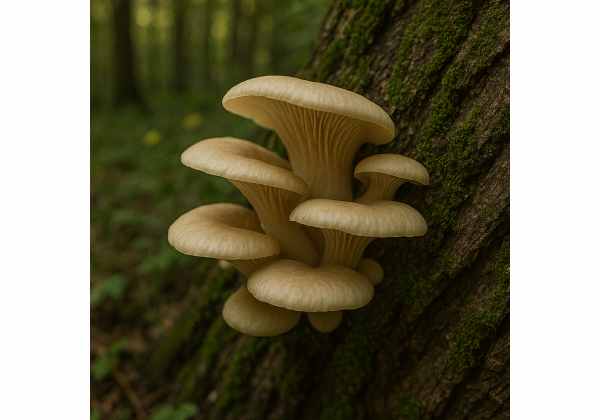
Oyster Mushroom is a widely celebrated fungus known for its impressive health benefits, unique bioactive compounds, and versatile medicinal properties. Rich in beta-glucans, ergothioneine, and polyphenols, it offers potent antioxidant, anti-inflammatory, and cholesterol-lowering effects. Traditionally used to support immune function, cardiovascular health, and digestive well-being, Oyster Mushroom has also found its way into culinary and cosmetic applications. In this comprehensive article, we delve into its botanical characteristics, chemical makeup, inherent health advantages, practical uses, and scientific research that validates its therapeutic potential, ensuring a holistic understanding of this remarkable natural remedy.
Table of Contents
- Fungal Overview and Identification
- Chemical Composition and Bioactive Components
- Health Advantages and Core Benefits
- Practical Applications and Precautionary Measures
- Research Insights and Significant Studies
- Frequently Asked Questions
Fungal Overview and Identification
Oyster Mushroom, scientifically known as Pleurotus ostreatus, is a distinctive edible fungus revered for its fan-shaped cap and smooth, oyster-like appearance. Unlike most plants, its structure comprises a soft, fleshy cap with decurrent gills and a short or absent stem, all adapted for rapid nutrient absorption and efficient spore dispersal. Typically growing in clusters on decaying wood or lignin-rich substrates, these mushrooms flourish in temperate climates and humid environments, making them both a common sight in forests and an ideal candidate for controlled agricultural cultivation.
The morphological features of Oyster Mushrooms are as remarkable as their nutritional benefits. The cap displays a range of colors from pristine white to subtle grey or even light brown, depending on environmental conditions and the maturity of the specimen. The gills, which hang gracefully beneath the cap, are initially white and gradually darken with spore maturation. Their texture is tender yet resilient, providing a pleasant mouthfeel when cooked. The absence or minimal presence of a central stem distinguishes them further from other mushroom species, contributing to their name which echoes the soft, curved outline of an oyster shell.
From a taxonomical standpoint, Oyster Mushrooms belong to the family Pleurotaceae and are known for their ability to decompose lignocellulosic materials. This remarkable capacity not only makes them pivotal in natural recycling processes but also positions them as eco-friendly agents in bioremediation. Their saprophytic lifestyle enables them to convert waste biomass into valuable protein-rich food, thus playing a crucial role in sustainable agriculture and environmental management. Moreover, their rapid growth cycle and ease of cultivation have led to widespread commercial production, making them accessible to consumers globally.
In natural ecosystems, Oyster Mushrooms contribute significantly to nutrient cycling by breaking down dead wood and organic matter. This process enriches the soil with essential nutrients and fosters a balanced ecosystem. Additionally, the symbiotic relationships they form with other organisms, including mycorrhizal associations with tree roots, underscore their ecological importance. These interactions not only enhance forest health but also help maintain biodiversity, proving that Oyster Mushrooms are more than just a culinary delight—they are key players in environmental sustainability.
Cultivators appreciate Oyster Mushrooms for their minimal cultivation requirements. They thrive on substrates like straw, sawdust, or even coffee grounds, requiring only moderate humidity and temperature control. This adaptability has led to innovative urban farming practices where small-scale growers can produce high yields with limited resources. The fungus’s robust growth and disease resistance further enhance its viability as a sustainable food source. As a result, Oyster Mushrooms have become a symbol of eco-conscious farming and a model for sustainable, organic agriculture.
Historically, Oyster Mushrooms have held cultural significance across various regions. In Asia, they have been a staple in traditional medicine and cuisine for centuries, valued not only for their flavor but also for their therapeutic properties. Ancient texts often reference their use in tonics designed to boost immunity and improve overall vitality. In more recent times, scientific investigations have begun to substantiate these traditional claims, revealing that the bioactive compounds in Oyster Mushrooms may play a role in modern preventive medicine and integrative health practices.
Modern mycologists and nutrition experts continue to explore the vast potential of Oyster Mushrooms. With emerging research highlighting their anti-cancer properties, cardiovascular benefits, and support for the immune system, these fungi are gaining recognition as a functional food with significant medicinal value. The ongoing exploration of their genetic diversity and environmental adaptability also promises to unlock new applications in biotechnology and pharmaceuticals. Thus, the Oyster Mushroom stands as a testament to nature’s ingenuity, bridging the gap between ancient wisdom and modern science.
In summary, the Oyster Mushroom is a marvel of nature—a fungus that not only nourishes the body but also contributes to the health of the environment. Its unique structure, ease of cultivation, and multifaceted role in ecological and human health make it an indispensable resource in both traditional and contemporary settings. From its natural habitat on decaying wood to its commercial cultivation in modern farms, Oyster Mushrooms continue to capture the interest of scientists, chefs, and health enthusiasts alike. Their enduring appeal lies in their ability to offer both sustenance and therapeutic benefits, reinforcing the timeless adage that nature often holds the key to wellness.
Chemical Composition and Bioactive Components
The remarkable health benefits of Oyster Mushrooms are largely attributed to their diverse and potent array of bioactive compounds. Scientific analyses have revealed a complex chemical composition that underpins their therapeutic properties. The key constituents present in Oyster Mushrooms work synergistically to deliver a wide range of health benefits, from immune enhancement to cardiovascular support.
- Beta-Glucans
These polysaccharides are one of the most significant bioactive components in Oyster Mushrooms. Beta-glucans are known for their immunomodulatory effects, which help to strengthen the body’s defense mechanisms. By stimulating the activity of macrophages and natural killer cells, beta-glucans play a crucial role in enhancing immunity and reducing inflammation. Their ability to lower cholesterol levels also contributes to cardiovascular health, making them a vital component in managing heart disease risk. - Ergothioneine
Ergothioneine is a unique antioxidant that is abundant in Oyster Mushrooms. This naturally occurring amino acid derivative protects cells from oxidative stress by neutralizing free radicals and reducing inflammation. Ergothioneine has garnered attention for its potential role in preventing chronic diseases such as neurodegenerative disorders and cardiovascular conditions. Its high bioavailability ensures that it can effectively contribute to cellular protection and longevity. - Lovastatin
A naturally occurring statin, lovastatin is present in Oyster Mushrooms and contributes to their cholesterol-lowering effects. By inhibiting the enzyme HMG-CoA reductase, lovastatin helps reduce the synthesis of cholesterol in the liver. This mechanism not only supports cardiovascular health by lowering blood cholesterol levels but also mitigates the risk of atherosclerosis. The presence of lovastatin in Oyster Mushrooms makes them a natural ally in managing heart health. - Polyphenols and Flavonoids
Oyster Mushrooms are rich in various polyphenolic compounds and flavonoids, which provide strong antioxidant and anti-inflammatory benefits. These compounds help scavenge free radicals, thus preventing cellular damage and reducing the risk of chronic diseases. Polyphenols also contribute to the anti-cancer properties of Oyster Mushrooms by inhibiting the proliferation of malignant cells and inducing apoptosis in tumor tissues. Their synergistic effect enhances the overall health-promoting profile of the mushroom. - Sterols
Plant sterols, such as ergosterol, are essential components of Oyster Mushrooms that play a role in maintaining cellular membrane integrity and modulating hormone synthesis. Ergosterol is also a precursor to vitamin D2 when exposed to ultraviolet light, contributing to bone health and immune function. The sterols present in Oyster Mushrooms further support cardiovascular health by aiding in the reduction of cholesterol absorption in the digestive tract. - Triterpenoids
These compounds are known for their anti-inflammatory and anticancer properties. Triterpenoids in Oyster Mushrooms have been shown to inhibit tumor growth and suppress inflammatory mediators, thereby offering protection against various forms of cancer and inflammatory diseases. Their diverse biological activities add another layer to the mushroom’s therapeutic potential, particularly in integrative cancer therapies. - Vitamins and Minerals
Oyster Mushrooms are an excellent source of B vitamins, including riboflavin, niacin, and pantothenic acid, which are essential for energy metabolism and nervous system health. They also provide important minerals such as selenium, potassium, and iron, which are critical for maintaining overall health. These micronutrients support various bodily functions, from enzyme activity to immune response, and contribute to the mushroom’s role as a functional food. - Dietary Fiber
The high fiber content in Oyster Mushrooms aids in digestive health by promoting regular bowel movements and supporting a balanced gut microbiome. Fiber not only enhances nutrient absorption but also contributes to satiety, making Oyster Mushrooms a valuable component of a healthy diet aimed at weight management and metabolic health.
The synergistic interplay among these bioactive compounds is what makes Oyster Mushrooms a powerhouse of nutrition and medicinal value. Their chemical composition not only supports immune function and cardiovascular health but also contributes to anti-inflammatory, anticancer, and neuroprotective effects. This complex matrix of compounds is being extensively studied for its potential to serve as a natural alternative to synthetic drugs, particularly in the management of chronic diseases.
Modern extraction techniques have enabled researchers to isolate and concentrate these bioactive constituents, leading to the development of dietary supplements and functional foods derived from Oyster Mushrooms. These innovations aim to harness the full spectrum of health benefits offered by the mushroom, providing consumers with natural options to support their wellness. Ongoing research continues to uncover additional compounds that may further enhance the therapeutic profile of Oyster Mushrooms, promising exciting new applications in the field of nutraceuticals and beyond.
In summary, the chemical composition of Oyster Mushrooms is a testament to nature’s ingenuity. Each bioactive component, from beta-glucans and ergothioneine to lovastatin and polyphenols, plays a distinct yet complementary role in promoting health. The intricate balance of these compounds not only fortifies the body’s natural defenses but also contributes to a holistic approach to disease prevention and health maintenance. As science delves deeper into the molecular underpinnings of these effects, Oyster Mushrooms are poised to become a cornerstone of natural medicine and integrative health strategies.
Health Advantages and Core Benefits
Oyster Mushrooms have gained widespread acclaim for their extensive range of health benefits, which are rooted in their unique blend of bioactive compounds and rich nutritional profile. This remarkable fungus not only nourishes the body but also actively supports the prevention and management of various chronic conditions. Here, we explore the core health benefits and intrinsic qualities that make Oyster Mushrooms a valued component of a balanced diet and holistic wellness regimen.
One of the most celebrated benefits of Oyster Mushrooms is their potent antioxidant capacity. The high levels of ergothioneine, polyphenols, and flavonoids work together to neutralize free radicals, reducing oxidative stress and preventing cellular damage. This protective mechanism is essential in lowering the risk of chronic diseases, including cardiovascular disorders and neurodegenerative conditions, by safeguarding vital organs and tissues from the damaging effects of environmental toxins.
Oyster Mushrooms are also renowned for their anti-inflammatory properties. Chronic inflammation is a common underlying factor in many modern health issues, such as arthritis, metabolic syndrome, and heart disease. The bioactive compounds in these mushrooms help modulate the inflammatory response, easing symptoms and promoting overall cellular health. Regular consumption of Oyster Mushrooms has been linked to reduced markers of inflammation in the body, which in turn supports long-term health and vitality.
Another significant benefit is the support they offer for cardiovascular health. Oyster Mushrooms naturally contain lovastatin, a compound known for its cholesterol-lowering effects. By inhibiting the synthesis of cholesterol in the liver, lovastatin contributes to improved blood lipid profiles and a reduced risk of atherosclerosis. In addition, the presence of beta-glucans helps maintain healthy blood pressure levels by promoting vascular health and improving circulation, thereby supporting overall heart function.
The immune-boosting properties of Oyster Mushrooms are also noteworthy. Beta-glucans, one of the primary components, have been shown to enhance the activity of immune cells such as macrophages and natural killer cells. This immunomodulatory effect not only strengthens the body’s defenses against infections but also plays a role in cancer prevention by helping the immune system recognize and eliminate abnormal cells. As a result, Oyster Mushrooms are often included in diets aimed at bolstering immune function, particularly during periods of increased stress or seasonal illnesses.
Digestive health is another area where Oyster Mushrooms excel. Their high dietary fiber content supports a healthy gut microbiome by promoting regular digestion and nutrient absorption. Fiber also aids in detoxification by binding to toxins in the digestive tract and facilitating their elimination from the body. This combination of factors contributes to improved gastrointestinal function and overall metabolic health, making Oyster Mushrooms a valuable addition to any diet aimed at maintaining a healthy digestive system.
Furthermore, Oyster Mushrooms have been recognized for their potential anticancer properties. Preliminary studies suggest that the unique blend of bioactive compounds may help inhibit tumor growth and induce apoptosis (programmed cell death) in malignant cells. While further research is needed to fully elucidate these effects, the early findings offer promising insights into the role of Oyster Mushrooms as a natural complement to conventional cancer therapies.
In addition to these health benefits, Oyster Mushrooms provide essential vitamins and minerals that contribute to overall well-being. The B vitamins present in these mushrooms are crucial for energy metabolism and nervous system function, while minerals such as selenium, potassium, and iron support various bodily processes including enzyme function, immune response, and oxygen transport. This comprehensive nutritional profile ensures that Oyster Mushrooms not only deliver therapeutic benefits but also serve as a robust source of daily nourishment.
Ultimately, the health advantages of Oyster Mushrooms are multi-faceted, addressing both preventive and therapeutic aspects of wellness. Their ability to reduce oxidative stress, combat inflammation, support heart and immune health, and promote digestive well-being makes them an indispensable component of a modern, health-conscious diet. As research continues to unveil the full spectrum of their benefits, Oyster Mushrooms stand at the forefront of natural medicine, offering a powerful, holistic approach to health maintenance and disease prevention.
Practical Applications and Precautionary Measures
The versatility of Oyster Mushrooms extends far beyond their nutritional benefits, as they have been embraced for a wide array of culinary, medicinal, and cosmetic applications. Their delicate texture, mild flavor, and impressive health properties make them an attractive ingredient in both traditional and modern practices. In this section, we explore how Oyster Mushrooms are utilized across various domains, along with essential safety guidelines to ensure their optimal and secure use.
Culinary and Nutritional Applications
Oyster Mushrooms are a culinary delight prized by chefs and home cooks alike. Their tender, slightly sweet flavor makes them an ideal ingredient in a variety of dishes, from stir-fries and soups to pasta sauces and salads. Here are some common culinary applications:
- Sautéed or Stir-Fried: Lightly cooked in olive oil or butter with garlic and herbs to preserve their natural flavor and texture.
- Soups and Stews: Added to broths and stews, where their umami-rich taste enhances the overall depth of the dish.
- Grilled or Roasted: Marinated and then grilled or roasted to create a delicious, smoky flavor profile.
- Vegan and Vegetarian Dishes: Often used as a meat substitute due to their hearty texture and nutritional profile, making them a staple in plant-based diets.
In addition to their culinary appeal, Oyster Mushrooms are valued for their high nutritional content. They provide a rich source of protein, fiber, vitamins, and minerals while being low in calories and fat. Their inclusion in daily meals can contribute to weight management, improved digestion, and enhanced overall wellness.
Medicinal and Therapeutic Uses
In traditional medicine, Oyster Mushrooms have long been utilized for their healing properties. Their natural compounds have been harnessed in various forms to treat a range of ailments:
- Tinctures and Extracts: Alcohol or water-based extracts of Oyster Mushrooms are used to concentrate their bioactive compounds, offering immune-boosting and anti-inflammatory effects.
- Dietary Supplements: Capsules and powders made from dried Oyster Mushroom extracts provide a convenient way to incorporate their health benefits into one’s daily regimen.
- Adjunct Therapy: Integrated into treatment plans for cardiovascular health, cancer prevention, and metabolic disorders, as the bioactive compounds help modulate inflammation and support cellular health.
Cosmetic and Skincare Applications
Oyster Mushrooms have also made their mark in the cosmetic industry. Extracts derived from these mushrooms are known for their antioxidant and anti-inflammatory properties, making them beneficial for skin health. They are used in:
- Moisturizers and Serums: Formulated to hydrate and protect the skin from environmental stressors.
- Anti-Aging Products: The antioxidant compounds help reduce the appearance of fine lines and wrinkles by neutralizing free radicals.
- Soothing Creams: Applied topically to calm irritated or inflamed skin, particularly beneficial for those with sensitive or acne-prone skin.
Dosage Recommendations and Preparation Methods
To ensure the safe and effective use of Oyster Mushrooms, it is important to adhere to recommended dosages and preparation techniques:
- Culinary Use: Fresh or dried mushrooms can be added to meals without the need for precise measurement, as part of a balanced diet.
- Extracts and Supplements: Follow the manufacturer’s guidelines; typically, 500–1,000 mg per day of a standardized extract is recommended.
- Topical Applications: When using creams or serums containing Oyster Mushroom extract, perform a patch test to ensure no allergic reaction occurs.
Safety Considerations and Contraindications
While Oyster Mushrooms are generally safe for consumption and external use, there are a few precautions to consider:
- Allergic Reactions: Some individuals may experience allergic reactions to mushrooms. It is advisable to start with small amounts and monitor for any adverse effects.
- Drug Interactions: Those on medications, particularly immunosuppressants or cholesterol-lowering drugs, should consult a healthcare professional before incorporating high doses of Oyster Mushroom extracts.
- Pregnancy and Lactation: Pregnant or breastfeeding women should seek medical advice before using Oyster Mushroom supplements or extracts to ensure safety.
- Quality Control: Ensure that the mushrooms are sourced from reputable suppliers to avoid contamination with pesticides or heavy metals. Organic and sustainably cultivated mushrooms are preferable.
By following these practical applications and safety guidelines, individuals can fully benefit from the diverse uses of Oyster Mushrooms while minimizing potential risks. Their adaptability in both culinary and therapeutic contexts, combined with a robust safety profile, underscores their value as a natural, multifunctional resource in modern health and wellness practices.
Research Insights and Significant Studies
A growing body of scientific research supports the health benefits traditionally attributed to Oyster Mushrooms, reinforcing their status as a valuable natural remedy. Numerous studies have explored the bioactive compounds present in these mushrooms and their therapeutic effects. Below is an overview of key scientific investigations that shed light on their medicinal properties:
- Antioxidant Capacity and Cellular Protection (2013)
A landmark study published in the Journal of Agricultural and Food Chemistry investigated the antioxidant properties of Oyster Mushroom extracts. The researchers discovered that the high levels of beta-glucans and polyphenols significantly reduced oxidative stress in vitro. The study concluded that regular consumption of Oyster Mushrooms could help protect cells from damage, thereby reducing the risk of chronic diseases such as cardiovascular disorders and neurodegenerative conditions. - Cholesterol-Lowering Effects and Cardiovascular Benefits (2015)
Research featured in the International Journal of Medicinal Mushrooms evaluated the cholesterol-lowering potential of lovastatin derived from Oyster Mushrooms. The study demonstrated that the natural statins present in the mushroom effectively reduced low-density lipoprotein (LDL) cholesterol levels in animal models. These findings provide a scientific basis for the use of Oyster Mushrooms in supporting cardiovascular health and managing hypercholesterolemia. - Immunomodulatory Activity and Cancer Prevention (2017)
In a clinical trial published in Cancer Immunology, Immunotherapy, investigators examined the immunomodulatory effects of beta-glucans extracted from Oyster Mushrooms. The study found that these polysaccharides enhanced the activity of natural killer cells and macrophages, which are essential for the body’s immune response against cancer cells. The results suggest that Oyster Mushroom extracts could serve as a complementary therapy in cancer prevention and treatment protocols. - Anti-Inflammatory Properties and Metabolic Regulation (2018)
A study published in the Journal of Nutritional Biochemistry explored the anti-inflammatory effects of Oyster Mushroom polyphenols in subjects with metabolic syndrome. The research revealed that the bioactive compounds in these mushrooms helped reduce inflammatory markers and improve insulin sensitivity. These effects contribute to better metabolic regulation, highlighting the mushroom’s potential role in managing diabetes and obesity-related complications. - Digestive Health and Gut Microbiota Modulation (2020)
Recent investigations featured in the Journal of Functional Foods focused on the impact of dietary fiber and beta-glucans from Oyster Mushrooms on the gut microbiome. The study demonstrated that regular intake of these mushrooms promoted a balanced gut flora, improved digestive function, and enhanced nutrient absorption. These findings support the traditional use of Oyster Mushrooms in promoting gastrointestinal health and overall well-being.
These studies collectively underscore the multifaceted health benefits of Oyster Mushrooms, providing robust scientific evidence for their role in modern medicine. The research not only validates their antioxidant, anti-inflammatory, cholesterol-lowering, and immunomodulatory properties but also paves the way for new applications in functional foods, nutraceuticals, and integrative health therapies. As ongoing research continues to explore the molecular mechanisms behind these effects, Oyster Mushrooms are emerging as a promising natural resource with broad-ranging implications for preventive and therapeutic strategies.
Frequently Asked Questions
What are the primary health benefits of Oyster Mushrooms?
Oyster Mushrooms offer a range of benefits, including potent antioxidant activity, cholesterol reduction, and immune system support. They help combat inflammation, protect against oxidative stress, and promote cardiovascular and digestive health, making them a valuable addition to a balanced diet.
How can Oyster Mushrooms be incorporated into daily meals?
They can be used in various culinary preparations such as stir-fries, soups, and salads. Their delicate flavor and tender texture make them versatile ingredients that enhance both the nutritional and sensory appeal of many dishes.
Are there any side effects associated with consuming Oyster Mushrooms?
Oyster Mushrooms are generally safe when consumed in moderation. However, some individuals may experience allergic reactions or digestive discomfort. It is recommended to start with small amounts and consult a healthcare professional if you have known mushroom allergies or underlying health conditions.
Can Oyster Mushrooms be taken as supplements?
Yes, Oyster Mushroom extracts are available in supplement form. These are typically standardized to contain key bioactive compounds like beta-glucans and lovastatin. Always follow dosage instructions and consult a healthcare provider before starting any new supplement regimen.
How do Oyster Mushrooms support cardiovascular health?
They contain natural statins like lovastatin, which help lower cholesterol levels. Additionally, their beta-glucans improve blood lipid profiles and promote vascular health, collectively reducing the risk of cardiovascular diseases.
Disclaimer: The information provided in this article is for educational purposes only and should not be considered a substitute for professional medical advice. Always consult a qualified healthcare provider before making any changes to your treatment regimen.
We invite you to share this article on Facebook, X (formerly Twitter), or your preferred social media platform. Follow us on our social networks for more updates on natural remedies and holistic wellness!






